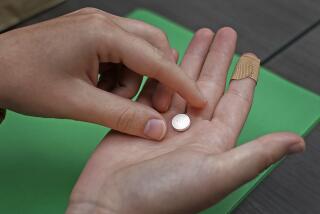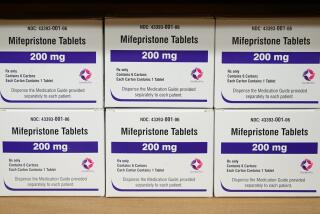Laxative-free colonoscopy may soon be possible
This post has been corrected. See note at the bottom for details.
A colonoscopy is a life-saving procedure, identifying polyps and early-stage tumors so they can be removed before they grow and spread. But many people refuse to undergo the procedure because they don’t relish having an endoscope inserted into their body, and they don’t like the preparation for the procedure, which requires drinking laxatives and spending large amounts of time in the lavatory the night before.
The first problem has been overcome in part by the advent of the virtual colonoscopy, in which a CT scan is used to survey the interior of the intestines from outside the body. But even virtual colonoscopy requires the use of laxatives to clean out the bowels beforehand. New research reported Monday, however, suggests that — at least for some people — the procedure can be performed without laxatives and diarrhea.
The key to the new procedure is an iodine agent that patients drink in small doses for two days prior to the procedure. Combined with a low-fiber diet, the agent binds to the feces in the bowel. When the CT is performed, technicians can electronically remove feces from the image, allowing doctors a clearer view of the bowel itself. The procedure is not for everyone, particularly those who have colon-cancer symptoms or are at high risk, but it could increase the number of patients who actually undergo a colonoscopy and reduce the death toll. Currently, about 50,000 deaths from colon cancer are tallied in the United States each year, making it the second leading cause of cancer deaths.
Dr. Michael E. Zalis of Massachusetts General Hospital and his colleagues studied 605 healthy, symptom-free adults between the ages of 50 and 85. All were at average to moderate risk of developing colon cancer. Each of the patients was first given the new laxative-free virtual colonoscopy, then a conventional endoscopy.
The team reported in the Annals of Internal Medicine that the laxative-free procedure detected 91% of polyps larger than 10 millimeters. Current guidelines call for removal of all polyps larger than 6 mm, but oncologists recognize that 90% of dangerous polyps are larger than 10 mm, the researchers said.
Researchers cautioned that the procedure was performed only at three specialized centers and that other sites may not be able to do it effectively without further development. And if doctors do find polyps, you are still going to have to undergo the normal preparation so that the polyps can be removed with an endoscope.
The study was funded by GE Healthcare and the American Cancer Society.
LATimesScience@gmail.com
Twitter/@LATMaugh
[For the record, 9:30 a.m. May 15: An earlier version of this post incorrectly referred to radioiodine-labeled tag. It is just plain iodine.]





